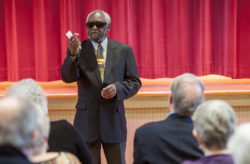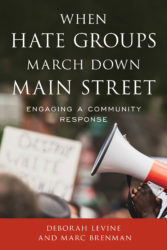New Year’s Eve had been a big event in my family. Every year we’d pack up and travel to Long Island spending the holiday at my aunt and uncle’s home with a house full of loved ones. Although I lived in Staten Island, New York at the time, and my cousin Christy lived in Long Island, New York, we were nonetheless close. We looked forward to New Year’s and when it was over, we’d count down the days until the next New Year.
Category Archives: About Us
About the American Diversity Report
SAFETY ALERT Part 1 – by Terry Howard
Sometime between a Sunday afternoon nap, raking leaves from my yard and watching NFL games in my “man cave” yesterday, I received the following message from my friend Troy from Houston, an emerging author. I read it several times and immediately determined that it must be shared broadly:
Yesterday my wife and I stopped at a local 7-Eleven to gas up her car. The card reader on the pump didn’t work, so I headed inside to pay for the gas. While I was inside, a white male in his mid-50’s drove up in front of the car and got my wife’s attention. She rolled her window down and this man told her that she had a dent in the back of her car. She opened the car door and was about to get out as I walked up. She told me what the guy had said about the dent. I looked at the car and said, “What dent?” He got out of his truck, came and looked at the back and said, “My eyes must have been playing tricks on me.” Got back in his truck and drove off.
Diversity Mission: Minority Legal Firm Incubator – By Mauricio Velásquez
When people talk about “Diversity and Inclusion Best Practices in the legal profession” we hear a lot of the same things over and over again. Well, I have come across a first, a truly innovative Diversity, Equity, and Inclusion leading best practice. You heard it from me first, right here, right now.
Harrity is the nation’s leading patent preparation and prosecution firm specializing in the electrical and mechanical technology areas, and is considered a Go-To firm for the Patent 300. Harrity recently launched its first Minority Firm Incubator program to help train, develop, and launch minority-owned patent law firms. This paid program is an integral part of the firm’s ongoing diversity initiative to recruit, retain, and advance attorneys who will contribute to the increasing diversity of the patent field.
Continue reading Diversity Mission: Minority Legal Firm Incubator – By Mauricio Velásquez
Our Gift of Harriet – by Terry Howard

His name is Stan Maclin. He lives in Harrisonburg, Virginia, having moved there 20 years ago. He is the founder and curator of the Harriet Tubman Cultural Center in that city.
It should come as no surprise then that Maclin’s Center has garnered national attention and many phone calls ignited by the recently released movie “Harriett,” the story of Harriett Tubman who single handedly made many forays deep into the south to free slaves.
When asked why he started the Center, in words that undoubtedly flowed from his mouth hundreds of times over the years, Maclin said that he wanted to open a place where African Americans can learn about their history, identity, and culture. He wanted to be able the educate future generations so that history does not repeat itself.
Book Review: When Hate Groups March Down Main Street – By David B. Grinberg
 FBI Director Christopher Wray recently told Congress the following about hate groups: “A majority of the racially motivated violent extremist domestic terrorism is at the hands of white supremacists.”
FBI Director Christopher Wray recently told Congress the following about hate groups: “A majority of the racially motivated violent extremist domestic terrorism is at the hands of white supremacists.”
Hate crimes increased by nearly 20% in 2017, according to the latest FBI data. The actual numbers are likely larger because many hate crimes go unreported or are misclassified for various reasons.
Another study on hate crimes among 30 big cities nationwide, by The Center for the Study of Hate and Extremism at California State University, states the following: “Hate crimes rose 9 percent in major U.S. cities in 2018, for a fifth consecutive increase, to decade highs, as cities with increases outnumbered those with declines two to one. In contrast, crime overall in major cities has declined in both of the last two years.”
Continue reading Book Review: When Hate Groups March Down Main Street – By David B. Grinberg
Why Thanksgiving Matters – by Lisa M. Scuderi-Burkimsher
I’d be lying if I said I didn’t enjoy the abundant amount of food we eat on Thanksgiving. In fact, I look forward to it every year. It’s one of my favorite holidays. But it’s more than just the food.
There are two reasons why Thanksgiving matters to me. The first reason begins when I was a child, we spent every Thanksgiving at my grandparents house in Brooklyn. My Sicilian grandmother barely spoke English and my grandfather had always been a quiet man; however, once the whole family with cousins, Aunts and Uncles were in the room, it had been a festive event of chortling and great food in a tiny apartment with one bathroom and approximately twenty-five of us.
Continue reading Why Thanksgiving Matters – by Lisa M. Scuderi-Burkimsher
Diversity and Speech Part 7: Critical Theory – by Carlos E. Cortés
This is the seventh in a series of columns based on my research as a former fellow of the University of California National Center for Free Speech and Civic Engagement. In these columns I have discussed what I call the diversity movement — the composite of the myriad individual, group, and organizational efforts to reduce societal inequities that penalize people because of their actual or perceived membership in certain social groups. In particular I have focused on the various issues raised concerning language and the exercise of speech.
In the past two columns I compared two threads of that diversity movement: intercultural diversity and equity-and-inclusion diversity. For the most part interculturalists emphasize voluntary speech restraint through the development of intergroup understanding. In contrast, while they often draw upon interculturalist principles, some inclusionists are more willing to pursue direct speech restraints, such as through regulations. When it comes to the third strand of the diversity movement, critical theory, its advocates tend to take an even stronger position in support of the direct restraint of speech, including through laws and codes.
Continue reading Diversity and Speech Part 7: Critical Theory – by Carlos E. Cortés
Hurdling Heavy Accents – by Terry Howard
Perhaps it’s attributable in part to shifting demographics, which has attracted people from across the globe, but there’s no denying the growth in cultures that have permeated Douglas and surrounding Georgia counties, their schools, businesses and neighborhoods. And that growth has been accompanied by an increase in the number of accents and the challenges that come with communicating through accent differences.
No matter how hard I work at it, I often struggle attempting to communicate with someone with a “heavy” accent. Am I alone? A situation a few years ago, one that left me feeling woefully incompetent, made this poignantly clear. Here’s what happened. Tell me if it resonates.
“Whitening” me? – by Terry Howard
In one of his legendary “folks, let’s not air our dirty laundry” features, Pulitzer Prize winning columnist Leonard Pitts began a recent column, “Blacks, too, judge each other by the color of their skin. How sick is that?” with this loaded old folk saying:
“If you’re white, you’re all right. If you’re brown, stick around. If you’re black, get back.”
Now the funny – well, no, maybe not always so funny – thing is that every now and then someone will put something out that makes you reflect on your own experience relative to that issue. And that old saying from my past is one.
